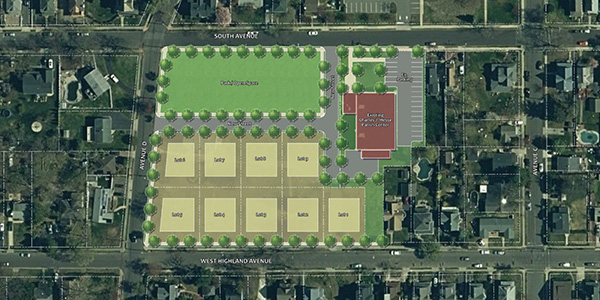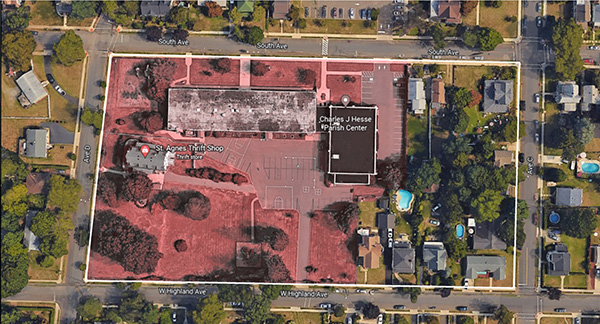
By Chris Rotolo
ATLANTIC HIGHLANDS – Where is the affordable senior housing and active community green space?
That was the question posed by concerned residents in attendance during the Nov. 10 meeting of the Atlantic Highlands Borough Council, which unanimously adopted an ordinance – minus the recused Mayor Loretta Gluckstein – that introduced a development plan for a 3.6-acre parcel connected to the vacant Mother Teresa Regional School and St. Agnes Thrift Shop. Following that adoption, the council also approved a resolution to advance the plan to the borough planning board for a consistency review.
The 34-page development plan includes two conceptual renderings that are concentrated on the construction of residential homes on the property, which has frontage along West Highland Avenue, Avenue D and South Avenue.
The first rendering includes a subdivision of the property for nine single-family homes – including five along West Highland Avenue – two newly constructed access roadways, and park space on South Avenue where the regional school currently stands. The Charles J. Hesse Parish Center and adjacent parking lot remain untouched.
The second rendering does away with the parish center, the proposed park, and one of the access roadways along Avenue D to create room for a total of 13 single family residences.
A special planning board meeting had been scheduled for Monday, Nov. 14 to receive the plan and conduct a consistency review. That meeting was subsequently canceled in the wake of Thursday’s contentious proceedings, and the review is now expected to be completed during the board’s regularly scheduled Dec. 1 meeting. Once that review is complete, the plan is due to come back before the council Dec. 15 for a public discussion and comment. Following public comment, the council will have the option to fully adopt the plan.
Initial conversation regarding the future of the parcel began in February 2019, before residents were invited to a September 2019 council meeting to share their hopes for the property, which is still owned by the Diocese of Trenton.
“Let’s jump back to the town hall meeting in September of 2019. Thirty-three residents spoke that night. Sixteen mentioned the need for senior housing. Fifteen of those 16 said they were for senior housing. That meeting was the last time this plan was discussed in public,” borough resident Mark Fisher said, noting there have been 30 executive sessions called since that initial public comment session.
The cancelation of the Nov. 14 planning board meeting seemed to align with Fisher’s argument that it would make sense to wait for the incoming council to approve any ordinances for the property and send it to the newly appointed planning board for review. “After 38 months, what’s the rush?” Fisher asked.
Atlantic Highlands Business Administrator Robert Ferragina said he had no concern with the council’s decision to continue the process before the onboarding of newly elected officials occurred.
“For the past year that I’ve been here, and I haven’t been here since 2019, I’ve heard the governing body be told that they weren’t moving fast enough. Now they’re being told that they might be moving too fast,” Ferragina said.
“If there are decisions that the new governing body or planning board need to make, they’ll be fully capable of making them.”
In June 2019, the council designated this property as an area in need of redevelopment. During the September 2019 meeting, resident proposals for the redevelopment plan centered on housing options to accommodate senior residents who wished to remain in town but may be unable to afford the costs associated with their current home. New construction was discussed for a potential project, as well as a more cost-effective option to simply transform the vacated regional school into residential quarters.
Ideas for the remaining acreage included the development of a public green space, as well as a recreation area with turf soccer fields, and even a public pool that could be converted into an outdoor ice rink during the winter months.
Former borough resident Kate Wigginton debated whether the development plan contradicted the goals of the Atlantic Highlands Master Plan, which aims to curb “future development and population density.” In regard to future development, the master plan also expresses a need to include “a balance of waterfront open space and recreational activity, and ensure an investment in infrastructure that supports a sustainable pattern of land use.”
Whether or not the development plan adheres to the expressed goals of the master plan is a question the planning board will consider during its Dec. 1 assessment.
The article originally appeared in the November 17 – 23, 2022 print edition of The Two River Times.















